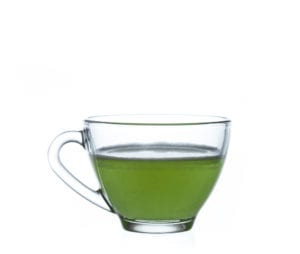Written by Angeline A. De Leon, Staff Writer. Twelve months of green tea supplementation improved the lipid profiles of the participating postmenopausal women compared to the placebo group by significantly decreasing TC, LDL-C, and non-HDL-C.
 Currently, cardiovascular disease accounts for the highest number of annual deaths, both in the U.S. as well as abroad 1. While effective management of cholesterol has proven to be difficult through the use of LDL-lowering drugs and statins alone 2, diet therapy may offer greater long-term success for patients. Dietary intake of green tea, for example, is associated with numerous health benefits, including immune support and lowered risk for chronic disease 3. The primary bioactive component in green tea, epigallocatechin gallate (EGCG), demonstrates significant cholesterol-lowering effects, particularly for total cholesterol (TC) and low-density lipoprotein cholesterol (LDL-C) 4. Meta-analyses have linked green tea extract (GTE) with significant improvement of serum lipid profile in various populations 5. The effects of GTE supplementation in postmenopausal women are of particular interest, given the higher incident rate of heart disease in this demographic group 6. In a study published in the American Journal of Clinical Nutrition (2016), researchers conducted a one-year trial examining the impact of GTE intake on the blood lipid profile of healthy postmenopausal women.
Currently, cardiovascular disease accounts for the highest number of annual deaths, both in the U.S. as well as abroad 1. While effective management of cholesterol has proven to be difficult through the use of LDL-lowering drugs and statins alone 2, diet therapy may offer greater long-term success for patients. Dietary intake of green tea, for example, is associated with numerous health benefits, including immune support and lowered risk for chronic disease 3. The primary bioactive component in green tea, epigallocatechin gallate (EGCG), demonstrates significant cholesterol-lowering effects, particularly for total cholesterol (TC) and low-density lipoprotein cholesterol (LDL-C) 4. Meta-analyses have linked green tea extract (GTE) with significant improvement of serum lipid profile in various populations 5. The effects of GTE supplementation in postmenopausal women are of particular interest, given the higher incident rate of heart disease in this demographic group 6. In a study published in the American Journal of Clinical Nutrition (2016), researchers conducted a one-year trial examining the impact of GTE intake on the blood lipid profile of healthy postmenopausal women.
A total of 936 women (aged 50-70 years) were recruited for participation in a randomized, double-blind, placebo-controlled trial. Participants were randomly allocated to receive GTE (containing 1315 mg catechins and 843 mg EGCG) or identical placebo daily for 12 months. At baseline and at 12-month follow-up, researchers assessed standard circulating lipid panels, including TC, LDL-C, high-density lipoprotein cholesterol (HDL-C), and triglycerides from fasting serum samples.
After 12 months of supplementation with green tea, a significant decrease was evident in circulating TC (-2.1% vs. 0.7%, p < 0.0004), LDL-C (-4.1% vs. 0.9%, p < 0.0001), and non-HDL-C (-3.1% vs. 0.4%, p < 0.0032). In particular, TC was significantly reduced in women with high TC concentrations at baseline (200 mg/dL or higher) who were treated with GTE (p-interaction = 0.01). No improvements were reported for the GTE group on HDL-C and triglyceride levels.
Overall findings suggest that supplementation with green tea may enhance the serum lipid profile of postmenopausal women, particularly those with elevated baseline TC concentrations. The efficacy of GTE in improving cardiometabolic risk factors may offer a useful, inexpensive complement to conventional treatment of CVD through statins and other pharmaceutical therapies. The precise mode of action by which green tea extract and EGCG induce their lipid-lowering effects are still unknown, however, and thus, require further investigation in the future.
Source: Samavat H, Newman AR, Wang R, et al. Effects of green tea catechin extract on serum lipids in postmenopausal women: a randomized, placebo-controlled clinical trial. Am J Clin Nutr. 2016; 104: 1671-1682. DOI: 10.3945/ajcn.116.137075.
© 2016 American Society for Nutrition
Posted November 30, 2017.
References:
- WHO. Global Status Report on Noncommunicable Diseases. 2010; Description of the global burden of NCDs, their risk factors and determinants. Available at: http://www.who.int/nmh/publications/ncd_report2010/en/. Accessed November 26, 2017, 2017.
- Expert Panel on Detection E. Executive summary of the Third Report of the National Cholesterol Education Program (NCEP) expert panel on detection, evaluation, and treatment of high blood cholesterol in adults (Adult Treatment Panel III). Jama. 2001;285(19):2486.
- Wang Q-M, Gong Q-Y, Yan J-J, et al. Association between green tea intake and coronary artery disease in a Chinese population. Circulation Journal. 2010;74(2):294-300.
- Nakachi K, Matsuyama S, Miyake S, Suganuma M, Imai K. Preventive effects of drinking green tea on cancer and cardiovascular disease: epidemiological evidence for multiple targeting prevention. Biofactors. 2000;13(1‐4):49-54.
- Zheng X-X, Xu Y-L, Li S-H, Liu X-X, Hui R, Huang X-H. Green tea intake lowers fasting serum total and LDL cholesterol in adults: a meta-analysis of 14 randomized controlled trials. The American journal of clinical nutrition. 2011;94(2):601-610.
- Van Den Brandt PA, Spiegelman D, Yaun S-S, et al. Pooled analysis of prospective cohort studies on height, weight, and breast cancer risk. American journal of epidemiology. 2000;152(6):514-527.

